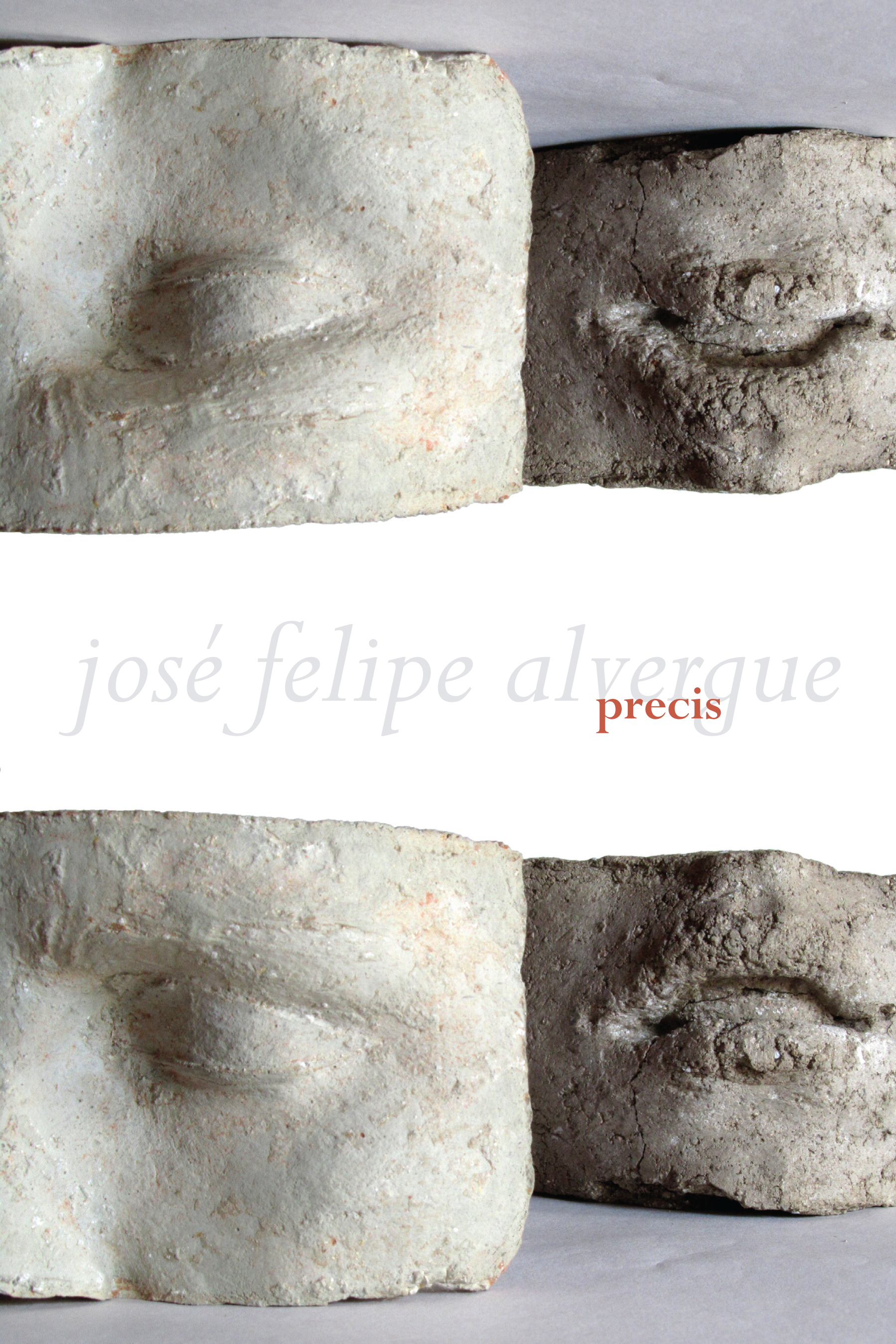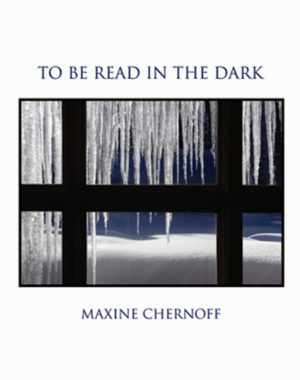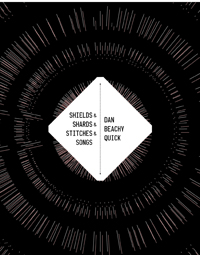Description
The border is a policed realm, neoliberal market, an affective landscape of spectral echoes, a geography of traces. These are the principles that assemble precis around certain coordinates. The death of a girl, a crossing narrative, media static of late-century rhetoric on border bodies, precis involves poetry in mapping the Mexico/US border and its relationship to America, while resisting the urge to impose a definitiveness. precis, in its sustained breath, simply asks: What about the body? What about the personal and the communal? In precis the reader is asked to follow along without forgetting that overshadowed in every moment of the known, every authorization of what is, there is a print or silence asking what should there also be.
precis, with its stutters and silences and its “broken strain of memory,” rises as a prayer against election year stump speeches that impose “on bodies the politics of narrative purpose.” Even in its precarity, no wall can be built to keep this precis, this prayer, from making its way inland or on shore, from disturbing those narratives that criminalize a people, leave them for dead, and re-criminalize them in their death. “From silence,” Alvergue writes, “the crossing begins,” “to give form to what [has] been lost,” to map the porous borders of “Amnesia y Ame?rica.”
ROSA ALCALA?
precis is a forensic report and an austere memorial to lives forever perishing into the fractures of national asymmetries. In the political forgetting, interpretive failures, and the uneven arenas of aspiration that tear human flesh asunder, metal bars sprout as from the skin and sand. Even from factory wastelands and shallow graves,Alvergue composes a poetic score whose music and visual arrangement turn the language of policy and pages from the press into ambient sounds for lyric episodes that confer prowess to a body poised for “bending calculating / distancing / streets measure pacing.”The ghosts of this particular place—the Tijuana-San Diego border—leave diagrams in the landscape that speak in this poem to the present choreographies of survival.
ROBERTO TEJADA
precis is both an expanded and emended version of Jose? Felipe Alvergue’s underexposed 2008 book, us look up/there red dwells. Centered on the accidental, if all too predictable, death of a young girl, killed by a drunk driver (and posthumously found guilty of jaywalking) in the small town of Sidro. precis redacts some of the sections in us look up explicitly concerned with the dialectics among indigenous, Spanish and English discourses for a more explicit cultural poetics of recent USA and Mexican histories. Specifi- cally, the book features a new middle section where two readings, two histories, of “development” along the USA/Mexican border collide as a palimpsest: former California governor Pete Wilson’s speech on immigration, immigrants and labor is overwritten by Alvergue’s disjunctive meditations on the precariat, borders, fences, topography, surveillance, etc., the ideological and material “weight” brought to bear on brown bodies. Concluding with a politically charged explication of the book’s making and its attempt to write back to empire, precis errs on the side of the human, reinscribing with a vengeance what, and who, are always under erasure.
TYRONE WILLIAMS
About the Author
Reviews
Excerpt
josé felipe alvergue was born in San Salvador, El Salvador, and grew up on the Mexico/US border. He is a graduate of both the Buffalo Poetics and CalArts Writing programs. As a grain of the Central American diaspora he works between text, performance, and archive in mapping the transnationalisms that shape residential identity. josé also teaches transnational and contemporary literature in Wisconsin, and is the author of gist : rift : drift : bloom (Further Other Book Works, 2015).
A brief interview with José Felipe Alvergue
(conducted by Gillian Olivia Blythe Hamel)
When I first read precis in one of Omnidawn’s manuscript contests, I knew this was a singular and important work that I absolutely wanted to publish regardless of the contest’s outcome. So many books of poetry and hybrid works have engaged collage, found language, illustration, and theory alongside the lyric, but I haven’t seen them all pulled together quite like you’ve done in precis – the work feels intensely intimate and yet unpretentiously unauthored, as if the language has risen organically from a great collective absence or place of forgetting. As you’ve said of the book, it ‘involves poetry in mapping the Mexico/US border and its relationship to America, while resisting the urge to impose a definitiveness’ – even the way the book is laid out resists organization and definitiveness. How do these different modes and media coalesce in your practice as you engage and dissolve borders – of the body, of the personal, of the communal?
The most difficult challenge for me as I was writing and “organically” putting the book together is exactly what you’ve pointed out: to capture something rather essential about the human experience of the geography, but leave it an unauthored geographic story. Through the personal, and the body, arrive at or map the communal as an utterly disinterested commons. Before turning to poetry, I wanted to be a lawyer, and envisioned myself getting involved in local politics (in San Ysidro/San Diego) because of my own and shared experiences with structural inequity. The fight for subjectivity has always concerned me in this sense of very real, material distributions of what we hold to be American enfranchisement. But I think there’s also, linguistically speaking, semiotically speaking, a self-consuming thread that leads one in circles when trying to write for or towards ‘the subject’ cast in this light, of a material-metaphorical feedback loop; it’s a philosophical problem of the contemporary mode of practicing the political around ‘the subject’. On one hand, the poet has to be able to conjure subjectivity in the codes which signify it in real life or signify its conditions––a proximate environment where the subject might be found. But also, in some way, the poet’s use of language must imply either a transgression/erasure, without undoing the reality we cohabitate within, and/or call for an ethical redress, for “justice,” which then also might admit the absence of the subject in the first place, as a sort of self-disavowal for the purpose of proving schematic disavowal. So for me, here I was faced with evidence of real death, Alma G., as well as real violence and disavowal, Eutiquia C. (both real human beings and real subjects of the border as schematic power and violence); and here I was faced with a genre of writing, call it Border Literature, that I found and continue to find problematically situated within an industry of emotional readership (reading with a sympathy that is coeval with inertia)––how might I write of the border without participating in the disavowal of its poetic spontaneity? The book took on many identities as I worked, and there were a lot of purposeful graphic, textual, and organizational decisions that served to distance the author, as well as put pressure on language. My ambition, especially with modes like the fingerprints for example, was to somehow capture excess, affect, and performatic spaces, yet not foreclose on a communicative event to also, and simply, tell, or say something. To say something about the condition of bodies, the personal, the communal and leave room for uncategoricals. There is this installation project at the border, of miles and miles of white crosses, and to me precis had to work as an installation in the same manner, though without the spatial necessity of one having to be physically in the place of the experience. It had to be sensible.
I’d like to ask particularly about your relationship to the many modes of language engaged in precis. There are moments of high lyricism intermingled with a plainer, almost documentarian speech – in English and Spanish – as well as incorporations of personal testimony, historical texts, local news clippings, and former California governor Pete Wilson’s 2006 speech haunts several pages; the book ends with something between afterword and exegesis, also interspersed with quotation. As Jean-Luc Nancy says, ‘the poem … makes us speak more than it says’ – how, in your work, do you see all these types of speech communicating, interrupting, exploiting each other in their movement through poetic space?
That’s funny you bring up Nancy, and I think immediately, also, of Nancy’s conversation with Derrida (“Eating Well”) on ‘the subject’. I suppose what the modes of language exploit from each other, or extrapolate from each other are strands of commonality that do not require an explicit narration of the commons––mostly because, as I see it, the commons at the border is sustained through adherence to a neoliberal schema, what Rob Halpern identifies in Common Place as the discursive fungibility of “public utility,” and which is one that is monological. Neoliberalism, amongst other modes of authoritarianism, instrumentalizes acts of language, even those that are relational (semiotic) for the purpose of metabolizing bodies, both in corporeal and imaginative ways. So I suppose what I was hoping was for a poetic space existing within the already spoken space of the border. In other words, I had less of a plan, more of an ambition to write ambience, disinterest, and let the elements of this environment signify poetically. By including these different elements there is undoubtedly an authorial hand at work, but many of them were also included for a kind of everydayness, like the grammar lessons, maps, etc. I wanted to present them in a disinterested disposal to modality, and just have them be with each other. The maps, also, I had to work over to disentangle them from already spoken modes of signifying, isolating what was essentially environmental and not culturally fluent or coherent in the epistemological practices of hemispheric colonialism. The Torolab Colective in Tijuana did a GPS map of the border by sewing transmitters into their clothing and then just going about the business of living at the border, and I was thinking of these spontaneous flows with the maps of arrows as well as the vaster flows of industry and NAFTA traffic. I think, again, the biggest challenge was in letting these elements open a space of ambivalent commonality (non-national, or postnational semiotic relationships), however, also not let that space be indifferent to the very specific bodies I felt and feel are most precarious in these arrangements (of labor, migration, sexualization, etc.), like the gendered specificity, and geopolitical precarity of some of the lyric voices I chose to write of.
precis is a strikingly and purposefully visual work as well – the arrangement of text blocks, illustrations, and varying type sizes/faces all speak with intention toward the work’s polyvocality, as though drawing a physical map with language. Would you speak to your relationship to text as a visual medium, particularly in regards to this work? In what ways does the notion of the book as artifact communicate with the oral/aural qualities of precis’s language(s)?
While I was at Buffalo there were many of us interested in the book as artifact, or at the very least the book, the whole book, as a poetically speaking event. For me this fascination is also a counter-narrative to the capitalistic narrative of national identity, as polyvocality disrupts the hegemonic understandings of ‘who we are’ and ‘who we will be’. In other words, it forces us to reconsider the epistemic ‘what is’ and the ethical ‘what ought to be’, and then reconsider it again, again, again… I think politics and conceptualism are bound to ways of perceiving the world aesthetically. While theoretically grounded, my fascination is also rather basic: I just think language in the everyday comes to us too easily, and here I mean language as totality. I think there are a couple of reasons why or how the book as artifact opens a space for an essential re-enchantment with the aural identity of language, which is far more complex and promising than our daily interactions with/through language. I’d say the sustained poetic encounter provides practical opportunity for enchantment. I’d include as ‘the daily’ those coopted experiences of language that lead to the loss of basic empathy, the loss of solidarity in the contemporary era. I think empathy and consumerism are far too much aligned via language as daily public usage. Empathy is a bridge to be approached in the honesty of way-making––it can’t be purchased in the fluency of a narrative or expectational qualities of ‘a book of poetry’ or a ‘border story’. If I may: I work at a predominantly white university, with students (and faculty) from rather racially and religiously homogenous communities, small towns, etc. As is the national trend, we deal with issues of racial prejudice and insensitivity, ignorance, and so on all the time. White fragility is of course rampant. The exceptionalism of white privilege, as an entrenched aesthetic and conceptual outlook on the world in its material organization and the accumulation of entitlements, I think, permeates many public forums and forms of relation, including our commercial relationship to books. Such that, the literature that is prioritized is often also literature that maintains a status quo (not just for content but also for formal approachability), or ways of reading/evaluating literature that elide historical fact, complexity, and anti-exceptionalism (like public school text books now wanting to refer to slaves in America as “workers”). I think there’s a relationship between what ‘we’ value as cultural production and what is maintained as the positional status quo between bodies, and what we’re willing to hold in fascination as the “spirit” of cultural identity via cultural production; I write and enjoy books that resist or diverge from precedent fragility, from commercial/instrumentalized relation. I think language is an environment that provides context for our temporalities yet to be schematized. Aurality to me sustains the logic of such an environment.
I’d love for you to talk about any writers, artists, thinkers who have influenced you in this work; in what direct or indirect ways have you felt this influence? And perhaps you could talk about who you’re reading currently? With whom do you feel a kinship, a provocation, a catalyzing relationship of some kind?
Jean Toomer’s Cane has always been a book I keep close. I teach it often, which also means I get to re-read it often and in new contexts, with new insights. I was introduced to it ages ago by Quincy Troupe. It continues to bring me joy, if we understand joy to be a more complicated, sensible emotion. I like what David Byrne says: “I like a good story and I also like staring at the sea…” (How Music Works) I feel the same way about Theresa Cha’s Dictée. I suppose these books, in their organizational identity, their holism, and their unwillingness to surrender lyric attention or conceptualism but rather show them to be of a fuller aesthetic event than anyone by itself, have been very strong influences. I remember Salvador Plascencia’s People of Paper coming out the year after I finished my MFA and I remember thinking, why is this kind of experimentation permissible for the novel, but not for poetics? So maybe there’s always also been an oppositional influence there (not with Plascencia but with what I saw in his book’s reception). Recently I’ve been really enjoying Fred Moten’s trilogy (The Feel Trio, Little Edges, and The Service Porch), and Rob Halpern (Music For Porn and Common Place). It’s odd for me because I also have to produce scholarship, and so I feel like maybe I don’t get to enjoy writing as much, as I’m always trying to cannibalize or extract from books kernels of intellectual material. Maybe this is normal. When I teach poetry though, I think I get as close to enjoyment as I can hope, as discovery or enchantment, and so far students have really appreciated M. NourbeSe Philip’s Zong!, especially when we pause to read aloud what at first glance they cannot perceive to be pronounceable language. Also, Rankine’s Citizen. I’ve been surprised recently by Solmaz Sharif’s Look. It’s a great book––surprised I suppose because I tend to read books like the imaginary books I’d like to write: sustained, holistic works that ‘ask’ as they unfold. Cecilia Vicuña’s work for example. I love The Argonauts by Maggie Nelson. My spouse and I read this right before our son was born. In fact, there are some photos of my spouse reading this in the delivery room. While doing some of the last organizational work to precis it was less about what I was reading and all about what I was listening to. I was listening to a lot of Juana Molina, she is awesome. And Richard Skelton was my environment when I needed to feel like I had all the time in the world to work, when in fact I could only get a few minutes here and there.
Would you tell me a bit about yourself? Anything you might wish to share that would give a reader more insight into your life and work?
I was born in El Salvador right about the same time as the Civil War was beginning. We were able to move to the US, and we really got to experience radically different environments across the nation before settling into South San Diego, what is often referred to as the South Bay, and specifically the border, a nexus of communities: San Ysidro, Nestor, Otay Mesa, and Imperial Beach. It was a unique experience because we are Central American, and most other Spanish-speaking people there are of Mexican descent. Though, of course, it is not as homogenous as the anti-border rhetoricians would have you believe. I grew up with Filipinos, Samoans, African Americans, and many white people. Nothing is a simple story. No perceived homogeneity is evidence or reason for a rule of law. My high school was pretty abysmal, and I got a first row seat for understanding structuralism. In San Diego, the tax structure binds district income to school investment and so you can imagine how this plays out in a sprawled, segregated metropolis, with an added prejudicial assessment of areas militarized for the purpose of ‘border security’. I also believe, however, that no structuralism is determinism; but as a person of color I also feel very conscientious about saying that because it can become coopted into some sort of ‘boot-strap’ argument. I get the sense that I’m maybe, calmly, all over the place––an even-keel neurotic that looks for knowledge on anything while remaining ambivalent to just about everything. It’s a survival strategy. Yet as ambivalent as I am, I tremble in the laughter of my son, I brake for furry animals, and I often wish I were a better friend. I studied Political Theory as an undergraduate before turning to writing. But nowadays I wish I’d just become an ornithologist.
You were instrumental in the selection of the image that is used in the cover design for this book. Would you describe your considerations regarding the cover image? How does this cover align with your intentions for the book?
During the height of the time in question, early 2000s––the height of a confluence between militarization and neoliberal parastatalism (force and finance)––I was working for a Chicano art space and community education project called Voz Alta. They still operate in San Diego. There, I taught poetry at local schools, and got to work with many amazing artists and musicians in joint poetry/music programs, poetry/photography programs, youth theatre, etc. Carmela Castrejón Diego and I got to work with some bilingual students in a poetry/photography program where we gave students disposable cameras and we wrote poems from the photos, took photos for the poetry, and stuff like that. She was working on “Feel, Speak” at the time. They are casts of women’s faces, mouths, eyes, ears, and I believe she got to expand this work with some international artists. But the work always spoke to me, and I think there’s a strong kinship between the silent forms in the casts, the captured affect that transmits excess, and what I wanted to be doing with precis. I’ve always known that when the time came for precis to have a home, I’d ask Carmela for permission in using an image from “Feel, Speak.” I was happy that she remembered me! And that she agreed.
In Alvergue’s poetic collage tracing the human effects of the U.S.-Mexico border, he shows the border to be simultaneously a policed realm, a neoliberal market, an affective landscape of spectral echoes, and a geography of traces.
The sparkling scene outlines streetlights & border lights, freeway lights & reflections.
Complexity given transcendence a place always thought of. Such a small town
is Sidro.
Impart
a map of memories
–– the smell of brake dust is absent of faith.
This line goes ––
Inside the bar evidence & facts sit leaning.There, weight against the grain.The wood
sustaining. Inside the bar reasons explain violence, are explaining, or are explanations, or
& so on





